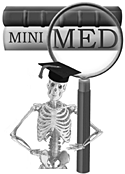Mini-Med to the max
Public thirst for medical knowledge will continue to be quenched at McGill. For the second consecutive year, the Faculty of Medicine will be offering its wildly popular Mini-Med courses to the general public.
 ILLUSTRATION: Tzigane
ILLUSTRATION: Tzigane |
|
Upcoming Mini-Med sessions will consist of eight crash courses on everything from anatomy to pharmacology. There are no prerequisites for taking Mini-Med courses - designed for anyone from 16 to 116 years old - and participants don't need to take exams or complete homework.
Last year, Mini-Med's 300 precious spots sold out within days and 400 people were placed on a waiting list. About 300 people from that patient lot will finally experience Mini-Med when the second round of courses begin on Oct. 16.
But demand continues to outpace supply. About 160 folks have been added to a new waiting list.
And the Mini-Med contagion continues. Although McGill was the first Canadian university to offer Mini-Med, the University of Toronto is following suit by launching a Mini-Med program this fall and the University of British Columbia plans to do the same next year.
Mini-Med was brought to McGill by Kappy Flanders, a member of the Board of Governors. The original concept was developed a dozen years ago by McGill alumnus Dr. John Cohen and is now available at some 75 teaching institutions across the U.S. and Europe.
Graduates of McGill's Mini-Med were so enthused with last year's program that most asked for follow-up sessions. McGill agreed to offer one additional lecture on Sept. 18. Called "Ethical Dilemmas in Medicine," the session will be taught by Margaret Somerville, founding director of the McGill Centre for Medicine, Ethics and Law.
Somerville looks forward to sharing some of her expertise to an audience of mostly non-academics, she says, "since learning how to analyse medical ethics is often a new experience for many people."
Somerville plans to tackle what she calls every day ethical issues, such as the care of dying people, to avant-garde realities, including human reproductive technologies and stem cell research. "Medicine has gone from fixing humans to designing humans," she says. "I hope that my talk will help people recognize there are many ethical issues worth analysing and that Mini-Med students learn the basics of how to handle such issues."
The Faculty of Medicine is budgeting $35,000 to offer Mini-Med sessions to the general public as an outreach effort. Participants are charged a nominal fee to enrol: $50 for adults and $25 for student and seniors.
Abraham Fuks, McGill's dean of medicine, says giving the general public an opportunity to learn more about medicine is a way for McGill to give back to the community. "The Mini-Med program is an exciting way to bring people to McGill, especially young people, who might not otherwise have come," he says. "This program allows them to learn what we're all about."
Fuks adds that Mini-Med also provides faculty a unique challenge - to teach complicated material in lay terms. "By preparing the background for lectures, having to use simpler words, having to answer questions, we begin to understand the material more clearly ourselves and that makes us better professors," says Fuks, who will be teaching his second Mini-Med session this fall.

